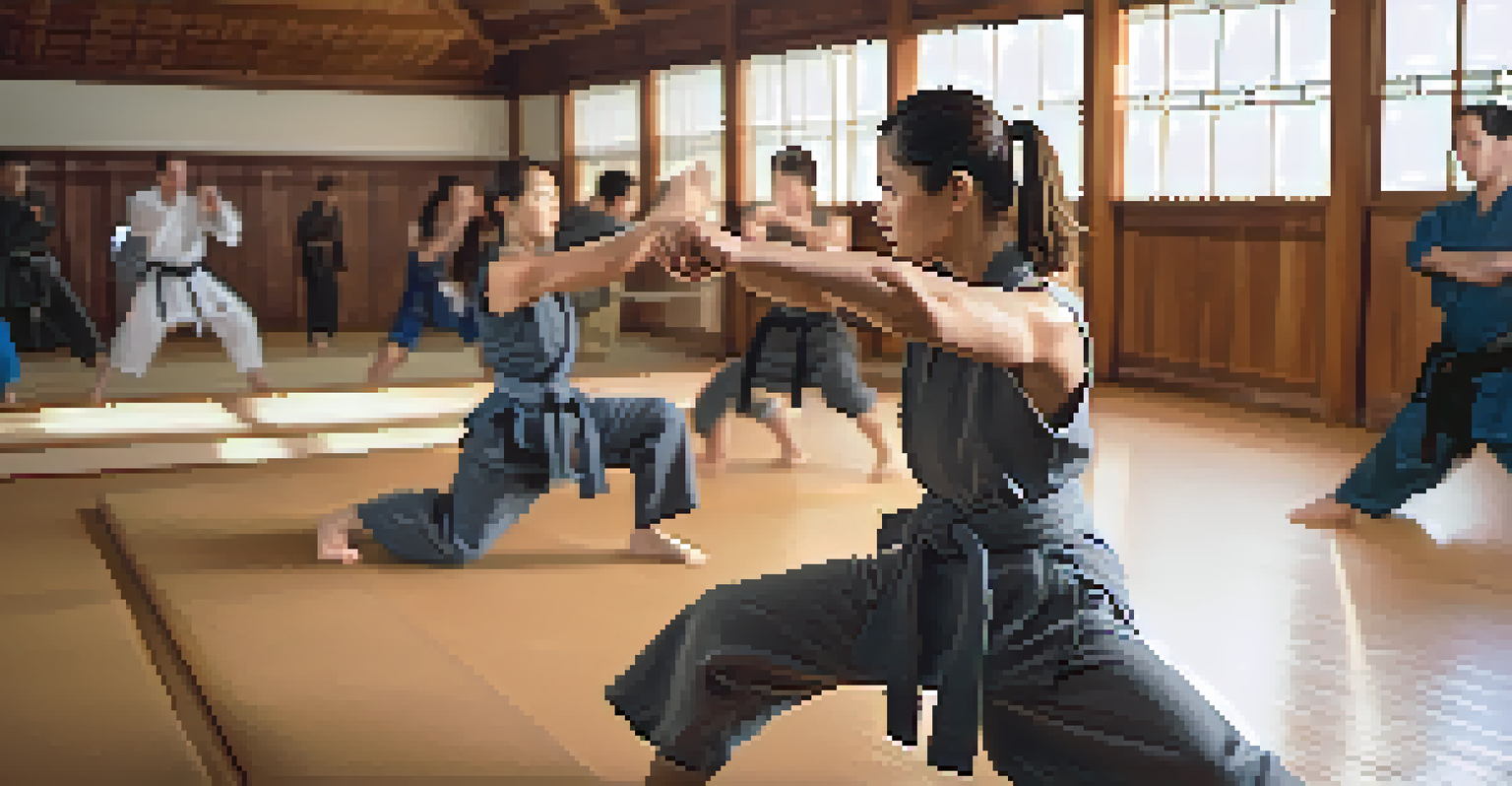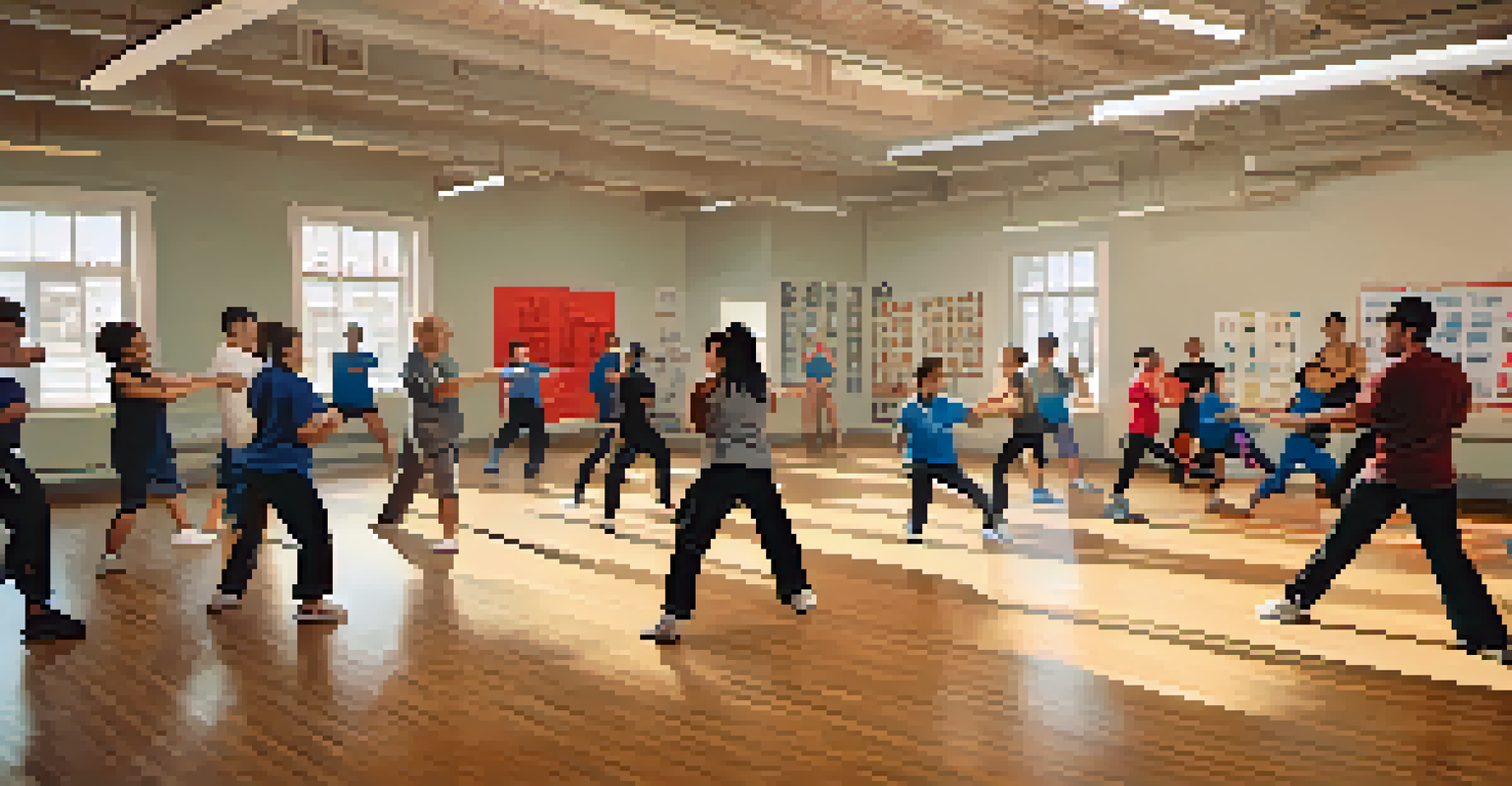Mental Resilience: The Role of Self Defense Training

Understanding Mental Resilience and Its Importance
Mental resilience is the ability to adapt to stress and adversity. It's like a mental muscle that helps you bounce back from challenges, whether they're big or small. In today's fast-paced world, cultivating this resilience is crucial for maintaining emotional well-being.
Courage is not the absence of fear, but the triumph over it.
When faced with difficulties, mentally resilient individuals tend to stay calm and focused. They view setbacks as opportunities for growth rather than insurmountable obstacles. This shift in perspective can lead to more positive outcomes in both personal and professional life.
Self-defense training can play a pivotal role in building this resilience. By learning to protect oneself, individuals gain not only physical skills but also a sense of empowerment that translates into greater mental fortitude.
How Self Defense Training Enhances Confidence
One of the most significant benefits of self-defense training is the boost in self-confidence it provides. When you learn how to defend yourself, you gain a sense of control over your environment. This newfound confidence can spill over into other areas of life, making challenges seem less daunting.

Imagine walking into a room full of people, feeling secure in your abilities. That’s the kind of self-assurance that self-defense training fosters. It’s not just about physical prowess; it’s about believing in your capacity to handle any situation.
Mental Resilience is Essential
Cultivating mental resilience helps individuals adapt to stress and view setbacks as opportunities for growth.
This increased confidence also helps in managing anxiety. When you believe you can protect yourself, you’re less likely to feel vulnerable, which can significantly reduce stress levels and promote a more resilient mindset.
Overcoming Fear Through Self Defense Techniques
Fear can be paralyzing, preventing you from taking action in critical moments. Self-defense training provides practical strategies to confront and manage fear effectively. By simulating real-life scenarios, individuals learn how to respond calmly rather than react impulsively.
Strength does not come from physical capacity. It comes from an indomitable will.
As you practice various techniques, you become more familiar with the feelings of fear and anxiety. This familiarity can help desensitize you to those emotions, making them easier to manage when they arise outside the training environment.
By learning to face and overcome fear, you cultivate resilience. Each time you successfully navigate a challenging scenario, you reinforce the belief that you can handle whatever life throws your way.
Building Discipline Through Regular Training
Self-defense training requires commitment and consistency, which fosters discipline. This discipline is not just about attending classes; it’s about setting goals and working towards them diligently. As you progress, you learn the importance of perseverance, a key component of mental resilience.
Establishing a routine for training can help instill a mindset of dedication. You begin to see the rewards of your hard work, which reinforces the idea that effort leads to success. This principle can be applied to other areas of life, promoting a resilient approach to challenges.
Self-Defense Boosts Confidence
Training in self-defense enhances self-confidence, allowing individuals to feel more in control and less vulnerable.
Moreover, the discipline developed through self-defense training encourages a growth mindset. You start to view challenges as stepping stones rather than barriers, empowering you to tackle life's obstacles with greater confidence and resolve.
Stress Relief and Emotional Regulation in Self Defense
Physical activity, including self-defense training, is a proven method for reducing stress. Engaging in intense workouts helps release endorphins, the body's natural mood lifters. This not only enhances your mood but also equips you with better emotional regulation skills.
As you learn to control your body in self-defense scenarios, you also learn to regulate your emotions. The focus required during training helps clear your mind, allowing you to approach stressful situations with a calmer, more balanced perspective.
By managing stress effectively, you build a resilient mindset. The ability to remain composed under pressure is a crucial skill that translates to everyday life, enabling you to face challenges with confidence.
Fostering a Sense of Community Through Training
Self-defense classes often foster a strong sense of community among participants. This supportive environment encourages individuals to share experiences and challenges, creating bonds that enhance mental resilience. When you know others are backing you up, it’s easier to face adversity.
Training with a group can also provide motivation and accountability. You’re more likely to push yourself when surrounded by others who share similar goals. This camaraderie fosters an encouraging atmosphere that can significantly impact your resilience.
Community Strengthens Resilience
Participating in self-defense training fosters a sense of community, providing support that enhances emotional strength and resilience.
Ultimately, being part of a community helps to build emotional strength. You learn that you are not alone in your struggles, and this connection can be a powerful tool in developing mental resilience.
Practical Application of Self Defense Skills in Daily Life
The skills learned in self-defense training extend beyond the dojo or gym; they can be applied in everyday situations. Knowing how to de-escalate a conflict or respond to a threat can significantly enhance your sense of security. This practical application reinforces the idea that you are capable of handling unexpected challenges.
As you integrate these skills into daily life, you become more aware of your surroundings. This heightened awareness can prevent potential threats and promote a proactive approach to safety, contributing to a resilient mindset.

Moreover, applying self-defense techniques in real-life situations reinforces your training. Each successful application builds confidence and resilience, creating a cycle of empowerment that helps you face life’s challenges head-on.